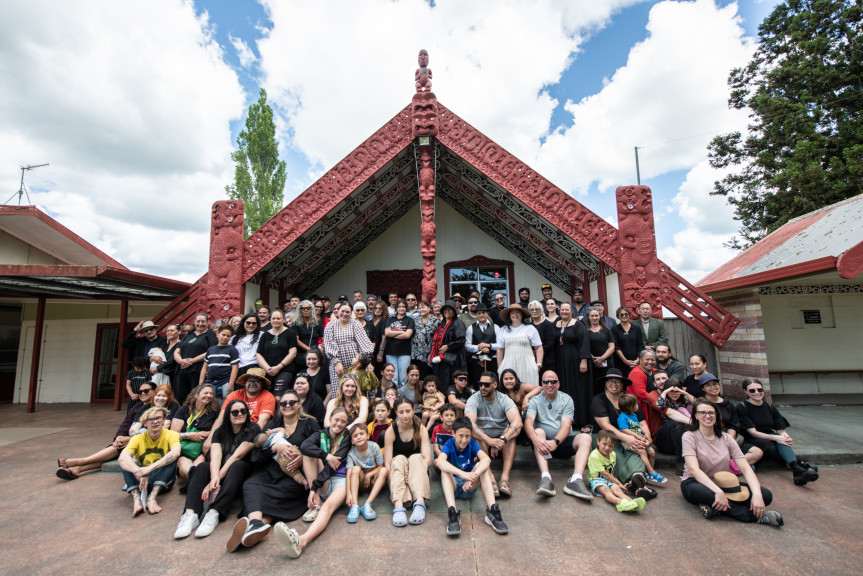Research
Published 22 May 2024Decolonising death: Reviving Māori burial practices

A Kaiarotake Rangahau Research Assessor from Te Pūtea Rangahau a Marsden The Marsden Fund reflects on her visit with Professor Hinematau McNeill (Tapuika, Ngāti Moko) and her research on urupā tautaio natural burials.
Written by Dr Grace O'Leary (Tūhourangi, Ngāti Rangitihi, Ngāpuhi)
As people think more and more about how they impact the planet, how we each plan to depart is one thought often overlooked. As part of her Marsden-funded project, Professor Hinematau McNeill (Tapuika, Ngāti Moko) from Te Wānanga Aronui o Tāmaki Makau Rau Auckland University of Technology (AUT) is researching the distinctly Māori practice of urupā tautaio natural burials. Her work is discovering how these practices are not only beneficial for our environment, but also offer iwi Māori affordability and opportunity for (re)connection with wairuatanga spirituality and oranga wellness.
During the second year of her project, Professor McNeill invites me to a hura pou – an unveiling ceremony for some recently carved atua and ancestral statues placed within an urupā cemetary where her research has been based. As a Kaiarotake Rangahau Research Assessor at Te Apārangi Royal Society, I have been following her team’s progress as they carry out a mixed-method study involving kaupapa Māori methodologies and site specific fieldwork in collaboration with Māori communities. I am honoured and excited to travel to Tapuika, Moko marae to learn more about the unfolding of this deeply ethical, deeply Māori research.
The team, who I meet at the waharoa includes Associate Invesigators Professor Hannah Buckley (AUT), Dr Robert Pouwhare (Ngāi Tuhoe, Ngāti Haka, Patuheuhe) and Research Assistant Kathleen Frewen (Te-Whānau-ā-Apanui, Whakatōhea). As we wait for the karanga, I ask ecologist Professor Buckley about her involvement on the project, which she describes as constantly evolving. Her work marries ecological restoration methods of pest and weed control with mātauranga Māori horticultural techniques guided by the maramataka (Māori lunar cycle) to inform best practice for urupā tautaiao development.
Te reo expert Dr Pouwhare has been making a key contribution to the project by capturing hui, wānanga, and interviews on film for production of a documentary. He delivers a powerful whaikōrero inside the whare tūpuna, Mokotangatakotahi, explaining the kaupapa of the project which is grounded in decolonising current thinking and challenges whānau to think about the ways that typical postcolonial tangihanga funerals damages Māoritanga, such as harming Papatūānuku.
Ngāti Moko hapū have given their humble blessing for Kenana urupā to be involved in this research. We gather at the gravesite where the team have been working with participants to remodel burial sites by removing and repurposing concrete, planting native trees and plants, and practise kaitiakitanga customary guardianship by drawing on mātauranga Māori together with ecological monitoring. The stunning pou, carved by James Teepa (Ngai Tūhoe) are unveiled and dutifully watch over the site while regenerating the spirit of past burial customs. Using ancient karakia (as opposed to karakia Karaitiana Christian prayers) is another demonstration of decolonisation in action, given the role and influence of the Christian church in marae-based communities. Professor McNeill speaks to the importance of the research in reclaiming the ora wellbeing of the land, for the ora of it’s people.

Tāngata gathered for the hura pou, Moko Marae. Image: Marcos Mortensen Steagall
Ngāti Moko concludes the day with a succulent hākari feast for their guests. New connections are made and enduring ones cultivated, and the aims and benefits of this project are made abundantly clear: reviving burial practices of old can not only address financial costs and impacts on the environment, but offer an important space for cultural empowerment. Bringing Māori together to be Māori.
RESEARCHER
Professor Hinematau McNeill (Principal Investigator)
ORGANISATION
Te Wānanga Aronui o Tāmaki Makau Rau Auckland University of Technology (AUT)
FUNDING SUPPORT
Te Pūtea Rangahau a Marsden The Marsden Fund
CONTRACT OR PROJECT ID
AUT2101 - Urupā tautaiao: Socially, culturally, and environmentally sustainable Māori burials
